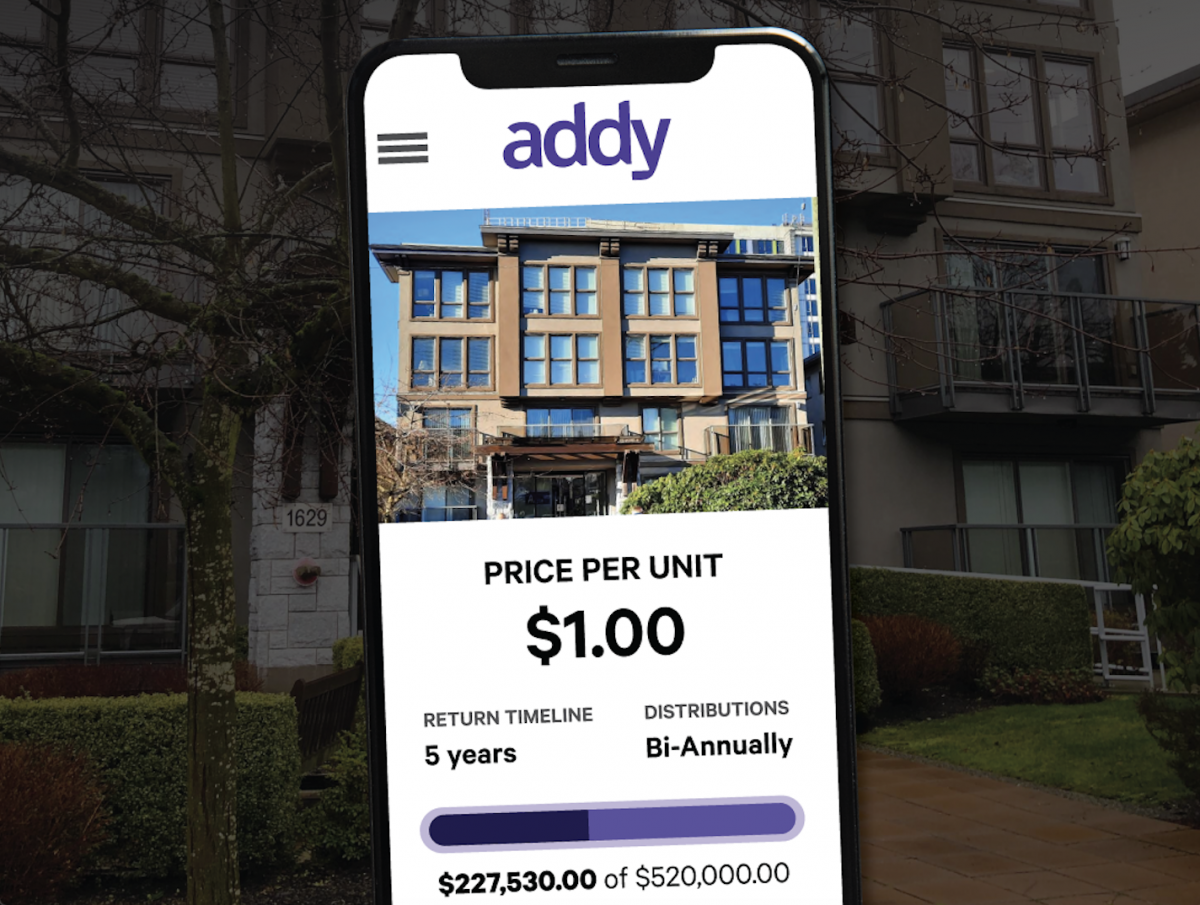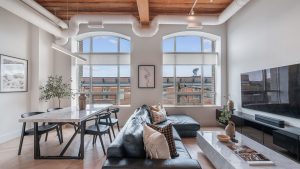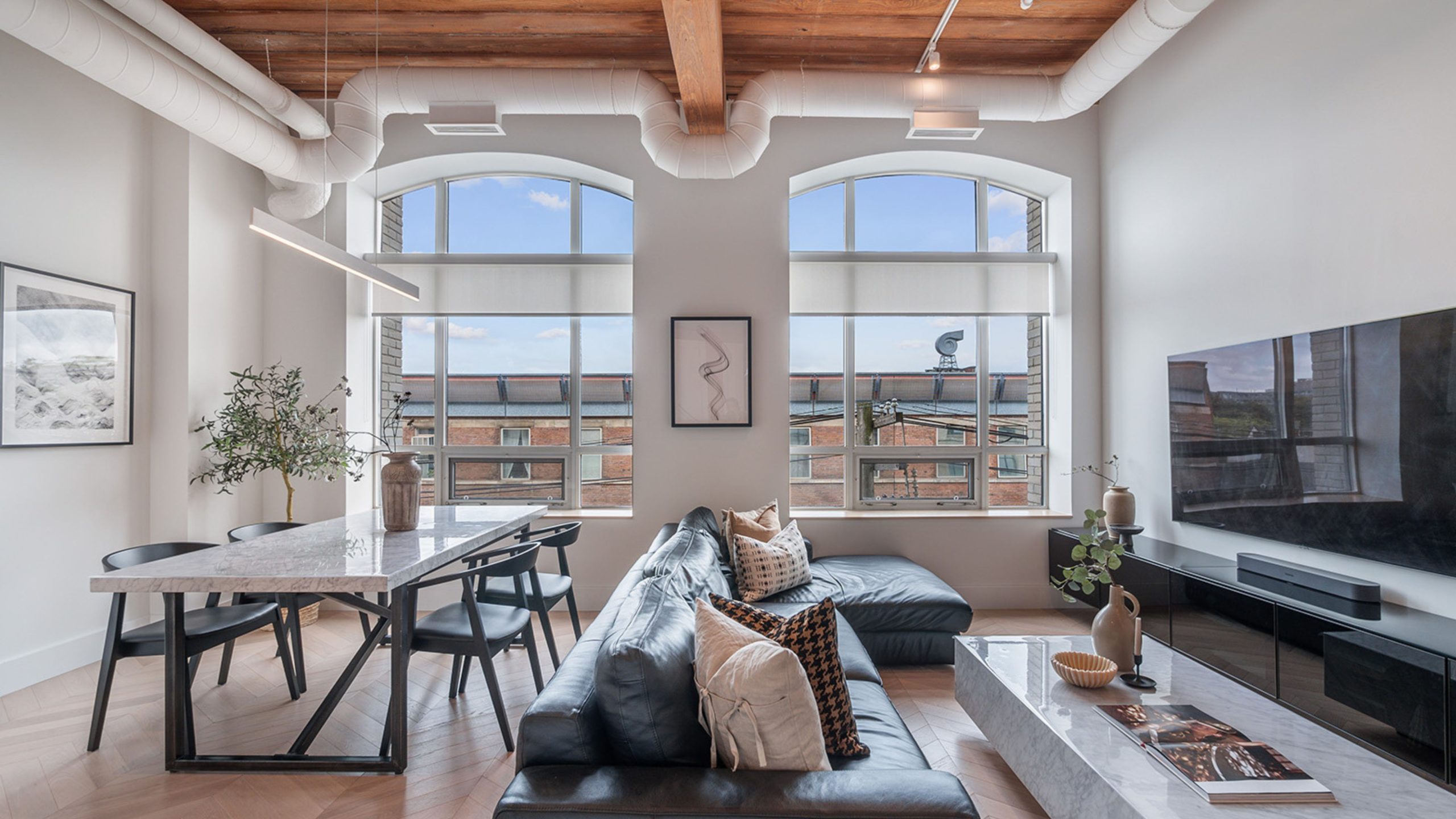[vc_row][vc_column][vc_column_text]Investing in real estate can be hard: 1) it’s risky 2) it’s expensive. With addy, those barriers are eliminated.
Co-founded by Stephen Jagger, Mike Stephenson, and Jeff Booth, addy’s crowdfunding approach to real estate investment allows its members to invest as little as $1, making the process accessible and affordable.
“People think letting people invest as little as $1 is a marketing thing, but it’s truly not,” said Jagger, Co-Founder and CRO of addy. “If we said the minimum was $100 and you had $80, all of a sudden addy itself is the barrier to your entry. So that’s why we do it at a dollar. You, as the investor, can choose what is a prudent amount for you. And we’re not in the way.”
Based out of Vancouver, B.C., the addy team scours the market for potential property investment opportunities. Once they vet and feel confident in a property’s potential, the listing goes up on addy. A member can choose whether to jump at the listed opportunity and just like that, they’re a homeowner—along with the other investors.
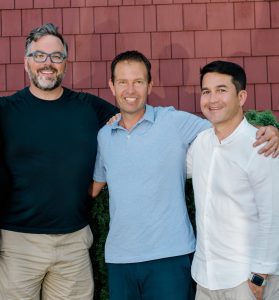

Jeff Booth, Co-Founder & Chairperson
Michael Stephenson, Co-Founder & CEO.
Since launching in 2018, addy has offered Canadians the chance to invest in properties across British Columbia, Alberta, and Ontario.
One commercial property (which has 833 investors) even houses a Starbucks as its tenant.
“You’re essentially getting paid money from Starbucks. Kind of the reverse of what we’re all used to— giving money to Starbucks,” laughed Jagger. “Those 833 investors each own a slice of this cool commercial building with a tier-one tenant. It’s amazing. We have people that drive out there to go to that Starbucks, just to take photos of it and send it to us.”
Over the last two years, addy has hosted various properties on the platform, from a single lakefront property on Trout Lake to a 22-unit apartment building in North Vancouver. It also has two upcoming properties (one in Vancouver and one in Toronto) that members will soon be able to invest in.
With each listing, addy takes another step towards making the real estate market more accessible. For this week’s Startup Spotlight, Bay Street Bull spoke with Stephen Jagger, Co-Founder and CRO of addy, about the Canadian real estate market and eliminating the barriers to enter it.[/vc_column_text][vc_text_separator title=”Q&A” color=”custom” style=”dashed” border_width=”5″ accent_color=”#5819d6″][vc_column_text]How can someone join addy and start investing in real estate?
On our website you can create an account by putting in your residential details and your government ID, then you can move money over to your ID wallet from your Canadian bank. When you’ve got your account up running and ready and with your money in it, and a property comes available that you’re interested in, you can see some of the due diligence available in your account, you can read the offering memorandum for that specific property (so you can understand the investment, the risks, the investment thesis, the plan for it, etc.) and if it all lines up for you, you can click and make an investment from $1 up to $1,500 into that specific property.
Once you’ve invested, updates will start to show up on the platform with your portfolio. You can follow along and “landlord” without doing any of the landlording. So, you can see how the property is going, when you’re expected to get a distribution, things that are happening around the property, like if a development across the street was announced. All kinds of stuff so you can follow along with your property in your portfolio.
When the distribution comes, the funds will show up back into your addy wallet, and then you can decide to either invest that in whatever addy property happens to be available or you can withdraw it back to your Canadian bank account.
Is there a cost to join addy?
There’s no cost at this moment to addy members.* They don’t pay us any fee. We’re not layering any costs. We don’t take a lift on the property. There’s no transaction fee, no withdrawal fee. Nothing. We don’t make any money at this moment. We’ve even subsidized a lot of the costs of what we’re doing so that the crowd’s not paying it.
Soon we will turn on a model for us to make money. We’re in the process of exploring what that will look like, and we’re working with our members and doing focus groups, and trying to understand how best to align with our membership. One of our core values is win-win or no deal. And we look at that very specifically and seriously for how we hire, for how we look at properties, for everything. We look at the cost that a member will pay in the same way. How do we roll out a fee that makes sense for the small investor and the larger investor, that is truly a win-win? How do we protect our small investors and ensure that addy doesn’t become the barrier to their entry?
*Editor’s note: Since this interview took place, addy has introduced optional membership plans. Read more about them here.
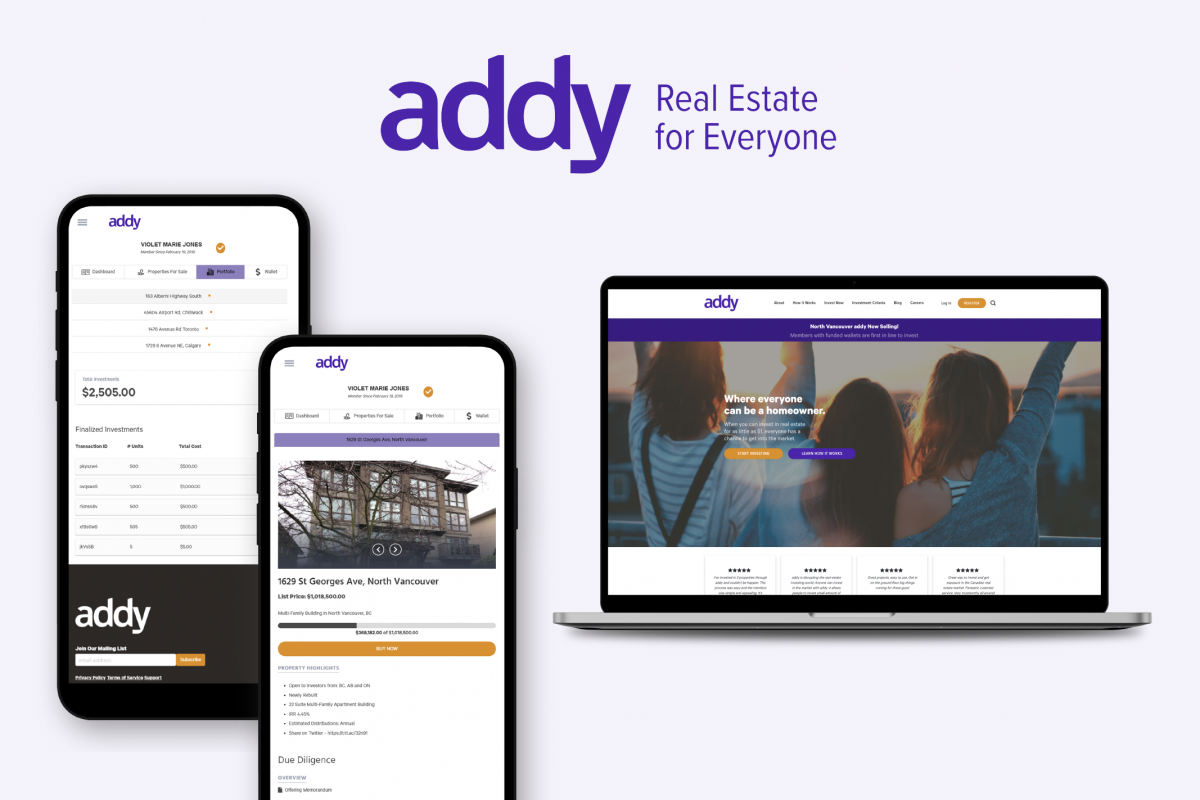

How is addy disrupting the housing market?
Addy’s job is to eliminate barriers to entry so that everyone can participate in the real estate market. So, being able to have access to the asset class itself. We’re doing that by using technology to drive the costs down and eliminate those barriers so people can get in and invest in real estate generally. Investing in real estate has very much become a wealthy person’s game, I think from all different sides. From an affordable housing point of view, it’s not just a Vancouver and Toronto problem, it’s a problem across most cities in Canada and most cities around the world.
In terms of housing affordability challenges, the government printing more money makes the dollar worth less, the Canadian stress tests make it difficult—there’s a lot of factors going on that make it difficult for your average Canadian to participate. We are in that space of changing the game and using technology to drive those costs down and eliminate those barriers.
In hindsight, the idea for addy seems so simple, but it hasn’t really been done before in Canada. How did the idea for addy come about?
Mike Stephenson and I have been business partners for about 20 years. Over that time, we’ve had some success and sold some companies and we’ve been personally buying real estate ourselves. In 2017, an opportunity came Mike’s way where a developer in Vancouver was interested in doing a project and they were raising money from investors to fund the project. Mike looked at it, liked it and the developer said the minimum investment size was $750,000. Mike asked the developer if it was okay to set up a company and have a few friends put money in and that have that corporation invest and the developers said it was fine. So, that’s what he did.
A handful of us put the money into that corporation. Then, that corporation invested. One of our employees at the time wanted to participate and he had $10,000 that he was hoping to participate in the deal, but the minimum that Mike had said when he was setting it up was $50,000 investments. The employee who had $10,000 didn’t take it lying down. He got a bit upset about it because $10,000 is a lot of money. He asked, “How am I supposed to invest in real estate if nobody lets me invest in real estate?”
The conversation kind of started there as to the costs [of real estate]. There are costs involved in doing things: signing paperwork, paperwork goes to a lawyer, the lawyer charges a fee. Whether you’re investing $100,000 or $10,000, the costs are generally the same to process the paperwork. So, the developer loses money on that investor because of the costs involved in taking money, and the ongoing cost of having multiple investors, and updating those investors as projects go on, increases the costs involved. The conversation spurred the idea of, “Maybe there’s a better way?” Maybe we can use technology to drive those costs down AND eliminate some of these barriers so that everybody can invest in real estate.
We set out with the first property, a house on the eastside of Vancouver that backs onto Trout Lake. We put it onto the platform, with the idea of proving that random people, everyday Canadians want to invest like this. They want to invest in a specific property for a small dollar amount and strangers are comfortable doing this. The overwhelming response was that yes, Canadians do want to do this. We have 305 investors on that first property and those 305 investors own a slice of a single-family house on the eastside of Vancouver.
It’s funny how $10,000 was originally too low, and now addy has investments as low as $1 and caps investments at $1500. Were there any problems in bringing it from that conversation and idea to being able to list that first property?
There were a lot of learnings that we had from that first property. As an example, we choose to do the $1,500 cap. It’s not a rule that we have to follow. We don’t want to put a property on the platform that’s a million dollars and have 10 people put $100,000 in, right? That’s not what we’re here for. We cap at $1,500 so we can get as many Canadians as possible into these properties. We want thousands of people into the properties. By doing that cap, we essentially make room for as many people as possible to participate.
If you look at our Calgary property that sold out a couple of weeks ago, we have 1,141 investors in that property. In the system right now is a North Vancouver apartment building that’s on track to have 2000 investors in it, which is insane. That’s 2000 people that own a 22-unit residential apartment building on the north shore. When you talk about housing affordability, we’re changing the game.
The residents of that building now have the opportunity to invest in the building that they’re renting from. It’s theirs. You could wear one hat and be the renter for your unit and you could also be an investor and participate in the financial benefits of the building.
As you said, addy is game-changing in how the housing market works. Were there any hurdles or concerns considering it hadn’t been done before?
Totally. There are tons of learning for us with the costs for what we’re doing. There are reasons why people haven’t been doing this—it’s very expensive for us to do what we’re doing. There are security commission costs, there are filing fees, there are legal fees involved in writing, offering memorandums, etc. There are all these opportunities for us to understand how the business works and understand all the costs involved to then build technology around driving those costs down, eliminating some of the costs, or finding ways better ways to do it.
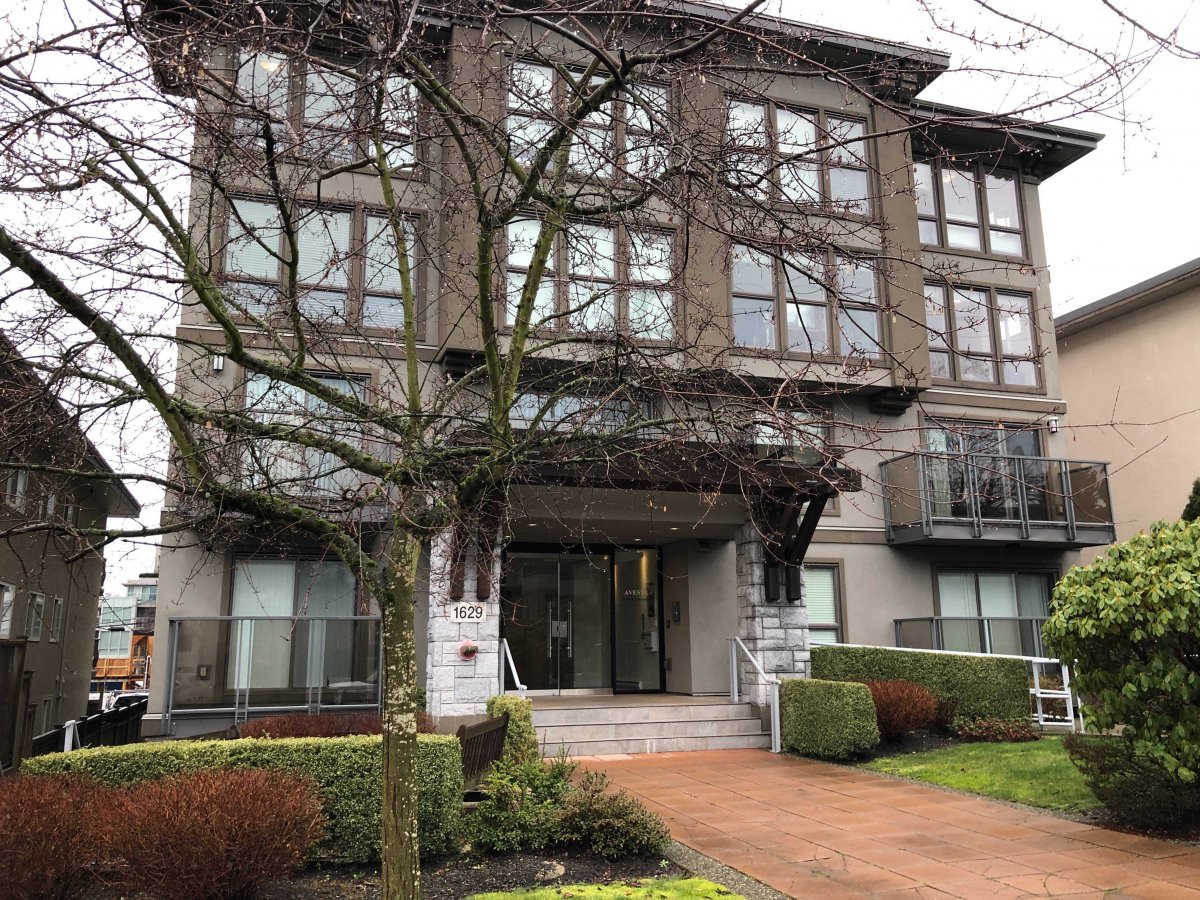

Do you have any standout stories or responses from someone that’s invested in an addy property?
Tons. It’s amazing. We have a Slack channel where we share them within our team.
One example is that generally when people move money into their addy wallet, it comes in flat dollar amounts: $50, $100, $150, etc. And I noticed that there was one member that was moving, $16.27 one week, then $9.08 the next. Very random amounts. And so I emailed him and said, “Hey, can I have a moment? Can we chat? I’d love to learn what the math is behind these numbers.” I figured maybe he’s a server and the money was his tips or something. We got on a Zoom call and I asked, “Who are you? What do you do? Why do you use Addy?” He was a young guy, 19 or 20, and was very sophisticated in how he thinks. He runs a spreadsheet for his income and his weekly expenses. Then whatever is left from his budget for the week, he allocates to real estate and that’s where the numbers come from. I think it’s so cool.
Another example is a single mother who had reached out to us who had invested in the Trout Lake property. The family lives out in Abbotsford (about an hour and a half away from the property) and she’ll drive into the city to visit and see the property and show her kids they own a slice of this Vancouver property.
We also had a guy that invested in our Toronto property because it’s across the street from a school that he wants to send his daughter to. I figured his daughter was 12 or 13, but then he sent us a picture and his daughter is a baby! He’s just thinking ahead, he knows where he wants his kid to go, and he likes the idea of owning a slice of a property in the neighborhood where he sends his child—it’s awesome.
And with your knowledge of the real estate market, because you’ve been in it for so long, what are your thoughts on how the pandemic has affected the market?
I don’t know. It’s hard to pin down what’s going on. It’s going through the roof in most major markets; Vancouver and Toronto seem to be going like crazy. Pricing is going way up—you see stories of realtors selling single-family houses with 50 offers on a house and it’s selling for half a million dollars more than they’re asking. Just unreal stories.
I wouldn’t be the best one to give thoughts on why that’s happening, because I think there’s a lot at play. The government printing money, maybe people having extra money. Some of it is just very confusing as to why some of these houses are doing what they’re doing. From our point of view with the pandemic, I think for us, it proved that having a good quality commercial tenant—like a Starbucks with a drive-thru—is important.
Even the CEO of Starbucks came out saying that their suburban stores with drive-thrus were performing well throughout the pandemic, whereas they’ve been closing stores that are in grocery stores and malls. A dine-in restaurant in that same building (as the Starbucks) would be a totally different investment opportunity. The whole outlook for the property would change.
The pandemic changed the outlook on a property and on what kind of tenants you want. We’ve seen that liquor stores, drug stores, and grocery stores are pandemic proof. So, if they’re your tenants, that’s good. If you had a bunch of mom-and-pop retail stores, it may be not as good because they’ve been struggling. So, it really depends on the property and the opportunity that’s out there.
Are you worried about addy having competitors and building off your business model?
We’re focused on building a good business and bringing value to our members. There are other opportunities like crowdfunding real estate in the U.S. and other countries, so there are competitors out there that are trying to do it in different ways.
What we’re trying to do is stay focused on what we can control, which is us building a good quality business, listening to our members, and understanding what they’re looking for. How can we be of service and bring value to them and grow the opportunities so that they can continue to invest through us? So far that’s working out for us.
Where do you hope to see addy five, 10 years into the future?
As we continue to grow, more and more properties are coming onto the platform. So, we’re about to launch two more properties—a Toronto property and a downtown Vancouver property—in addition to the property currently on the platform. We haven’t had multiple properties available at the same time before! From a strategic point of view, last year we thought it made sense to bring on one at a time, learn, figure it out, sell it out, then bring on the next. But now we think we’ve got a handle on what our membership is looking for and what their investment capability is. So, as we continue to grow, you’ll see more properties coming onto the platform, different sizes, industrial, residential, commercial, multifamily, in different cities.
Long term, I think there are a lot of options for us, in terms of where we can go and where we can take this. For now, we’re very much focused on eliminating those barriers to entry and giving Canadians access to this asset class that they generally don’t have access to.[/vc_column_text][vc_separator color=”custom” accent_color=”#5819d6″][/vc_column][/vc_row]
[yikes-mailchimp form=”1″ title=”1″ submit=”SUBSCRIBE”]


